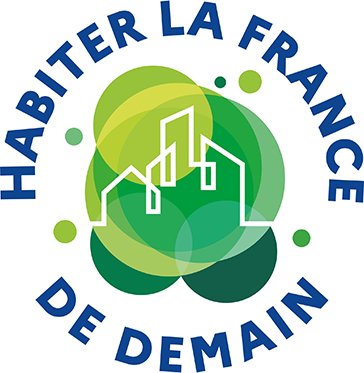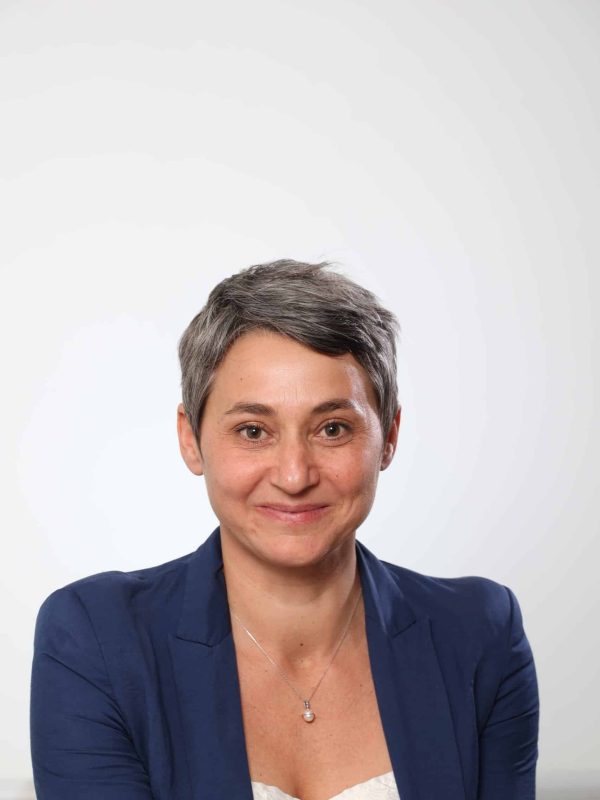Les Noés Eco-Village : from new town to sustainable neighborhood
A project proposed by the Ministry of Ecological Transition, Construction 21 and the Architectural Workshop Philippe Madec

Contributor
philippe_madec@me.com
Description
On the edge of the Eure river, the district has been designed in such a way as to accept the ten-, thirty- and one-hundred-year floods of this tributary of the Seine; the areas where the floods extend are spaces conducive to a quality landscape and rich biodiversity, which have taken the form of a landscaped park, urban market gardening areas, a conservatory orchard, and numerous meeting points: a public hall, a gardeners' house, allotments, and a meadow for donkeys.
The district's programme is mixed: 98 social housing units, for rent and for sale, a nursery and a central municipal kitchen. The complex is Passive House compliant and is supplied with hot water and heating by a 100% wood-fired urban boiler room supplied with locally produced wood chips.
Designed to give priority to pedestrians, it serves the housing buildings, facilities, allotments, the organic horticulture sector and the Berges de l'Eure park, whose creation it initiated; donkeys accompany the children to school and carry their school bags.
- Quality of housing
- Landscape
- Natural and aquatic environments, biodiversity
- Planning
- Urban renewal
- Decreased and active mobility
- Strengthening of social links and of solidarity
- Territorial food system
- District
Factsheet
- < 20,000 inhabitants
Distinction
Media
- https://www.atelierphilippemadec.fr/architecture/programmes-complexes/ecoquartier-desnoes-_-logements-creche-halle-_-qe-passif-et-zen.html
- https://www.construction21.org/france/city/h/ecovillage-des-noes.html
- https://www.latribune.fr/regions/en-normandie-l-eco-village-des-noes-un-laboratoire-de-r-durbaine-810482.html
- https://www.youtube.com/watch?v=x40Hgrs-Nzs&t=5s
- https://www.youtube.com/watch?v=B6K5aSs4wUs&t=1
- https://www.arte.tv/fr/videos/072763-003-A/ecotopies-n-est-pas-eco-quartier-qui-veut/
- https://www.dailymotion.com/video/x59lur5
Project evaluation*
based on contributor declaration
Criteria n°1: SUFFICIENCY
The site is located in the heart of the urban project of the new town of Val-de-Reuil, between the town hall and the station. The project has been designed to accommodate flooding from the Eure river by means of devices that do not involve major structures: diversion arms that can be used as pike spawning grounds, water expansion basins that accommodate wetland vegetation and fauna, wide flat ditches used as play areas for children, and narrower ditches planted between buildings to control the heat island effect. In addition, the project includes 100.8 m2 of green space per inhabitant and 20,000 plants, i.e. 160 different plant species from a “Norman” palette have been planted, representing 220 trees, 90 fruit trees, 9,000 shrubs and 10,000 perennials.
The use of bio-sourced materials was favored: wooden joinery, wooden solar protection, wooden cladding, wooden structures for the hall, the gardeners’ house, the shelters for the allotments.
The soil and stones moved for the construction of the hydraulic structures (diversion arms, deep ditches) remained on the site (excavation/embankment).
The LCA study demonstrated that the Ecovillage was particularly reasonable compared to a reference operation, in areas such as energy choice, thermal performance, waste reduction and water management.
The energy strategy defined for the Ecovillage sets an overall objective of zero fossil energy (ZEN). A ZEN area is an area which, on an annual basis, balances all of its energy consumption (as defined by the RT 2005) through the production of renewable energy.
The housing and the nursery are passive thanks to very effective external insulation, with good internal inertia, and guaranteed solarisation (2 hours of sunshine on 21 December). Solar protection is provided by folding shutters.
The collective boiler room is fed by local wood chips.
Individual probes are used to detect any heat loss problems, whether technical or behavioural.
The project is the result of a Design, Build, Operate and Maintain Contract procedure (CREM), which commits the companies to quantified results for the users. The company thus has a commitment to the consumption of the inhabitants.
In addition, the plants, a major element of the site, require very little maintenance (1 to 2 mowings per year) and because of their hydrophilic nature are adapted to the flooding of the site.
Criteria n°2: INCLUSION
In 2009, the project resulted from a competition. In order to involve civil society in the project during the competition period, the apm team brought in associations and cooperatives as project managers: Régie Nouvelle 76 for the reintegration housing, Association Solidaire for the food crops, and Liberty Crèche for the nursery. Once the project was selected, a public exhibition/debate was held.
From the beginning of the consultation process, the partners wanted to involve the population. In addition to a sociological study, and in order not to isolate the Ecovillage and to allow for perfect cultural and social integration, public meetings were held according to an effective principle, tested within the framework of the ADDOU procedure, which is an adaptation in the Brittany region of the Environmental approach to urban planning (AEU) of the ADEME (French agency for ecological transition). The quality of this ethical approach is that it allows for a real appropriation of the project by all those concerned, thanks to the construction of a common culture on the reasons, tools and forms of eco-responsible urbanism.
The inhabitants of the Ecovillage are made aware of the project as soon as they arrive, in particular via an information leaflet and a charter of good conduct and good practice, including a section on energy sobriety. Awareness-raising workshops on biodiversity and eco-citizenship are regularly organised with various actors: WWF, the YSOS Groupe SOS market gardening reintegration association, Chemin du Halage, the Normandy League for the Protection of Birds, and the BIOT beekeeper.
Particularly mixed, the program includes :
– Rental and ownership housing, in the form of collective and individual units;
– A collective boiler room using local wood;
– A municipal nursery with 30 cots and a central kitchen that allows the production of 90 meals/day for the city’s nurseries.
– A square with a public hall;
– A gardeners’ house and allotment gardens;
– Urban organic market gardening areas used for social reintegration;
– A public landscaped park with a conservatory orchard;
– A meadow for the donkeys
– A bird observatory.
The program is entirely social, composed of housing supported by Integrated Support Rental Loan (PLAI) / Social Rental Loan (PLUS …approvals, and public (2 facilities: crèche/cantine; public square/hall and numerous spaces open to all).
It thus responds to the fundamentals and needs of the town of Val-de-Reuil: more than 57 nationalities live there among the 15,000 inhabitants, a very high proportion of social housing (70%), a very dynamic and avant-garde town.
Finally, the organic urban market gardening zones help to promote social reintegration.
With a lot of media coverage (TF1 and France 2 news programs, Investigation of Regions on France 3, Libération, PQR…), the Ecovillage des Noés is presented in these reports by the inhabitants
as a vector for:
– A change in lifestyle and behaviour (start sorting);
– Economy and comfort (no need for heating).
Furthermore, the rate of transfers in this district is 2.6 points lower than in the rest of the SILOGE estate (10% vs. 12.6% on average since 2016).
Finally, it can be seen that the inhabitants of the neighbouring districts are involved in the life of the Ecovillage where they walk around. Moreover, half of the allotment gardens are occupied and cultivated by inhabitants of neighbouring districts.
In view of this enthusiasm, the SILOGE landlord has launched the rehabilitation of the adjoining Hameau of Andelle neighbourhood (99 lodgings) with the idea of a continuity of development, in order to better share these public spaces and to generalise these new uses.
Criteria n°3: RESILIENCE
Climatic resilience: The project has been designed in a bioclimatic way, to meet environmental challenges: north/south orientation to protect against cold northern winds in the Seine valley and to catch the sun (recovery of solar gain in winter), and to accept the overflow of the Eure river.
Economic resilience: The social rent and low energy consumption (Passive level and natural light even in the bathrooms) mean that the cost of living at Les Noés is low. It has been shown as an example of a frugal and social solution by TF1 and France 2 in a context of increasing socio-economic difficulties. In situ horticultural production adds to this resilience: allotments and market gardening areas.
Social resilience: The project is very social in order to respond to the characteristics and needs of the town of Val-de-Reuil. The production of vegetables, in a logic of free access and sharing, is part of this.
The calculation of the ecological footprint of the project was carried out by TRIBU.
The objective was to achieve a balance between footprint and biocapacity.
The result was that the project reached the biocapacity of France, i.e. Gha 2.9, distributed as follows: 0.9 for food, 0.5 for transport, 0.3 for housing and 1.2 for goods and services.
Critère numéro 4 : CREATIVITE
From the start of the project, the Ecovillage has participated in local and fair economic development.
The construction site has enabled several people to gain access to employment, through the integration clause provided for in the grouping’s contract, in such a way as to participate fully in local and equitable economic development.
Through the presence of market gardening activities and the nursery, despite its modest size, this project has created a dynamic in the neighbourhood, and well beyond, in the commune and the territory. This outreach was one of the main objectives set by SILOGE and the commune. The aim was to create a neighbourhood that would benefit everyone and serve as an example beyond the inhabitants.
These new activities have also generated new jobs on the Ecovillage site (12 to 15 in the long term), in the nursery and central canteen, as well as for the launch of the gardens and market gardening managed by an integration company already established locally.
The municipality of Val-de-Reuil is planning to set up an organic market on the site, under the recent hall, so that the production will benefit the entire local population.
Finally, the solution of heating with a collective wood-fired boiler, with the supply of wood chips of exclusively local origin, is ecologically responsible and creates wealth for the region and the sector.
Carried out as a Design, Build, Operate and Maintain project, this programme was an opportunity to mobilise and even develop the methods of multiple and complementary partners in social housing and environmental protection: the town of Val-de-Reuil, the Seine-Eure Urban Community, the Eure Department, the Regional Council, ADEME, the State, Europe, the Deposit and Consignment Office (Caisse des Dépôts et Consignations), LogiLiance, associative partners such as WWF, YSOS Groupe SOS, Chemin du Halage, LPO, not forgetting the innovative and involved local companies.
The municipality, the technical services and the agglomeration were involved in each phase of the project.
The Water Police were asked to help manage the risk of flooding on the Eure;
The Association YSOS groupe SOS, to define the horticultural and animation project.
The project management team was surrounded by numerous partners with specific knowledge and expertise. The project began with the construction of hydraulic works that kept the site dry during the major floods that the area experienced at the time. The use of recycled concrete in the construction of certain buildings made it possible to carry out life-size tests of this process.
Beforehand, the inhabitants were questioned in the framework of a sociological survey. Information meetings were organised, and once the project was completed, regular awareness-raising workshops were held with local associations and actors.
Finally, the Ecoquartier project was the subject of study for the “Green Growth” class of the High School Marc Bloch in Val de Reuil, and of visits by many other schools, but also by the media and elected officials.
The innovation in this project lies in the eco-responsible accomplishment in ALL aspects of the project and of all the actors of the project, which is rare.
Last criteria: potential of replicability ?
The approach and its requirements are replicable, not the project specifically designed for this neighbourhood. In this sense, a process of sharing experience is at work:
The Eco-district project is a subject of study for a “Green Growth” class at the Marc Bloch High School in Val-de-Reuil;
– The inhabitants of the Eco-village are made aware of the project as soon as they arrive, notably via an information booklet and a charter of good conduct and good practices, including a section on energy sobriety;
– The project has won many awards, been widely published, often presented at conferences and is the subject of visits organised by the CAUE;
– A book is planned to be published by MUSEO ” ECO-VILLAGE OF NOÉS IN VAL DE REUIL. Welcoming the en-common”.
– The project has been certified by the State, at Stage 3 to date and Stage 4 in progress.
The SILOGE social landlord has itself applied this approach and its requirements, adapted to other territories, to 2 other Ecoquartier projects, one rural (Ecodistrict Chênes in GROSSOEUVRE), the other in general rehabilitation (Les Sentiers in LERY). Moreover, methodologies and/or solutions are now regularly or even automatically used by SILOGE on all its programs. Finally, it disseminates this experience and its knowledge within the framework of the multi-donor coordination company TERRITOIRE & HABITAT NORMAND, approved in June 2020.












